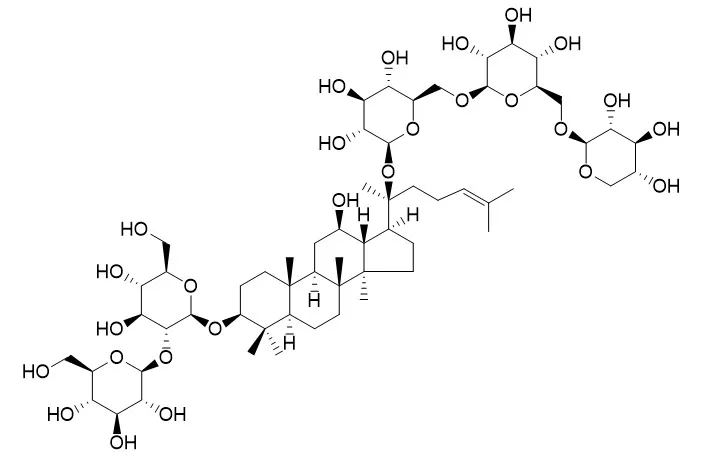Gap junctions have been shown or are believed to be involved in the pathogenesis of many inherited and acquired human diseases. Agents that regulate the gap junction-mediated intercellular communication (GJIC) function may facilitate prevention and treatment of GJIC-involved diseases.
METHODS AND RESULTS:
In the present study we examined the effects of 27 ginsenosides isolated from Panax ginseng on GJIC. The results show that compounds 1 (oleanolic acid), 2 (ginsenoside-R0), 3 (ginsenoside-Rb1), 5 (ginsenoside-Rb2), 7 (ginsenoside-Rd), 8 (ginsenoside-Rg3), 12 (panaxadial), 13 (Notoginsenoside R4), 17 [ginsenoside-Rg2 (20S)], 18 (ginsenoside-Rf), and 26 (ginsenoside-F3) did not obviously affect GJIC, whereas compounds 4 (ginsenoside-Rc), 6 (ginsenoside-Rb3), 9 (ginsenoside-Rd2), 10 (notoginsenoside-Fe), 11 (ginsenoside-Rh2),14 (ginsenoside-Ra1), 15 (ginsenoside-Re), 16 [ginsenoside-Rg2 (20R)], 19 (ginsenoside-Ia), 20 [ginsenoside-Rh1 (20S)], 21 [ginsenoside-Rh1 (20R)], 22 (ginsenoside-F1), 23 (protopanaxatriol), 24 (panaxatriol), 25 (ginsenoside-Rg1), and 27 (chikusetsaponin-L8) induced GJIC reductions at various degrees. Compounds 2, 7, and 8 protected against the tyrosine phosphatase inhibitor vanadate-induced GJIC reduction, while compounds 1, 5, 7, and 17 inhibited the cytokine interleukin 1 alpha (IL-1alpha)-induced reduction in GJIC. Nevertheless, no compounds protected against the protein kinase C (PKC) activator 12-O-tetradecanoylphorbol-13-acetate (TPA)-induced GJIC inhibition. On the other hand, GJIC reductions induced by compounds 6, 9,10, 20, 21, 22, 24, and 25 were inhibited by the tyrosine kinase (TK) inhibitor genistein, while GJIC reductions induced by compounds 6, 9, 14, 16, 19, 21, and 24 were attenuated in the presence of the PKC inhibitor calphostin C. However, GJIC reductions induced by compounds 4, 23, and 27 were not inhibited either by genistein or by calphostin C.
CONCLUSIONS:
These data indicate that various mechanisms are responsible for effects of ginsenosides on GJIC. |






 Cell. 2018 Jan 11;172(1-2):249-261.e12. doi: 10.1016/j.cell.2017.12.019.IF=36.216(2019)
Cell. 2018 Jan 11;172(1-2):249-261.e12. doi: 10.1016/j.cell.2017.12.019.IF=36.216(2019) Cell Metab. 2020 Mar 3;31(3):534-548.e5. doi: 10.1016/j.cmet.2020.01.002.IF=22.415(2019)
Cell Metab. 2020 Mar 3;31(3):534-548.e5. doi: 10.1016/j.cmet.2020.01.002.IF=22.415(2019) Mol Cell. 2017 Nov 16;68(4):673-685.e6. doi: 10.1016/j.molcel.2017.10.022.IF=14.548(2019)
Mol Cell. 2017 Nov 16;68(4):673-685.e6. doi: 10.1016/j.molcel.2017.10.022.IF=14.548(2019)